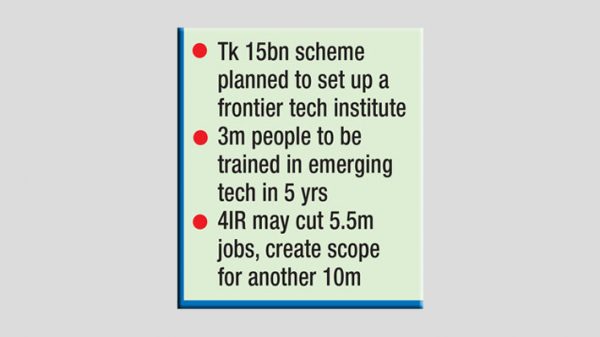Govt to build tech capabilities for 4IR

- Update Time : Thursday, February 3, 2022
- 107 Time View

The government will set up an institute of frontier technology to create enhanced capabilities in emerging technologies aimed at tapping the potentials of the Fourth Industrial Revolution (4IR).
Frontier technologies are emerging forms of technologies that will reshape industry and communications and provide more agile solutions to global challenges.
A Tk 15.03 billion scheme is set to be launched soon to set up the preliminary infrastructure for the proposed specialised institute named after Prime Minister Sheikh Hasina in Shibchar Upazila of Madaripur, Planning Commission sources said.
The ensuing fourth industrial revolution dominated by automation and artificial intelligence is feared to put the jobs of 60 per cent of garment workers at risk by 2030, suggests a study of Aspire to Innovate (A2I) Programme of the ICT Division.
It has posed a threat to the country’s productivity, employment, and overall socio-economic condition. The 4IR technologies will easily replace not only manual labour but also substitute many knowledge workers.
However, many IT experts think that the potential for job creation is much higher than the risk of job loss if the challenges are addressed properly.
Citing an A2I estimate, IT-ITES Policy Adviser of LICT project Sami Ahmed said against the fear of some 5.5 million job loss, there is also a prediction for 10 million jobs created by the emergence of 4IR.
Sami also said frontier technology would be one of the biggest catalysts for turning Bangladesh into a developed country by 2041 and the government is working to ensure the optimal use of it.
“Nearly three million people are expected to be provided training to build capacity on 4IR in the next five years,” he added.
The said ‘Construction of primary infrastructure for Sheikh Hasina Institute of Frontier Technology (SHIFT)’ project will be placed soon to the Executive Committee of the National Economic Council (ECNEC) for approval, Planning Commission sources informed.
After approval from ECNEC, Bangladesh Hi-tech Park Authority will implement the project by December 2026.
“Once the project is implemented, it will be possible to set up the country’s first frontier technology-based specialized institute through an industrial integration with the government and academia,” said Nasima Begum, member of the Socio-Economic Infrastructure division of the Planning Commission.
It will help establish the country’s first zero-waste, green, clean and sustainable campus blended with the modern mode of education and innovation culture.
With the scheme, Bangladesh is expected to become a self-sufficient nation in terms of ICT through collaboration between local and global stakeholders alongside establishing individual inclusive research facilities, and academic and industrial research.
For preparing the frontier technology-based talents, SHIFT will focus on biotechnology, nanotechnology, neurotechnology, cyber security, artificial intelligence, internet of things, robotics, blockchain, data science, hyper-automation, technological ethics, behaviour and experience engineering, innovation and entrepreneurship.
Any youth or capable people will be able to take frontier technology-based skill development training from the institute in online, offline or in both modes.
The frontier technology-based innovations and startups would contribute to creating the scope of jobs in different areas, including health, agriculture, education and finance, Sami said.
“The government has been providing funds for innovations and startups to increase investment in the sector and promoting research and development,” he noted.
Upskilling human resources should be the first plan of action — the unneeded workers must be trained in new technologies and skills, according to Bangladesh Association of Software and Information Services (BASIS) president Syed Almas Kabir.
“The game plan should also include re-skilling. Not all the redundant employees will be needed to be or will be able to be upskilled. It will be necessary to re-skill most of them and transfer them to other professions,” he said.
Displaced garment workers may be re-skilled to become nurses and caregivers and so on. Another important national strategy on a planned adoption of 4IR tech is imperative, he suggested.
Besides SHIFT, the government is also setting up Sheikh Kamal IT Institute and Incubation Centre, Centre for 4IR, Leadership Academy as part of its preparation for future work towards facing 4IR challenges as well as taking the opportunities out of it.















